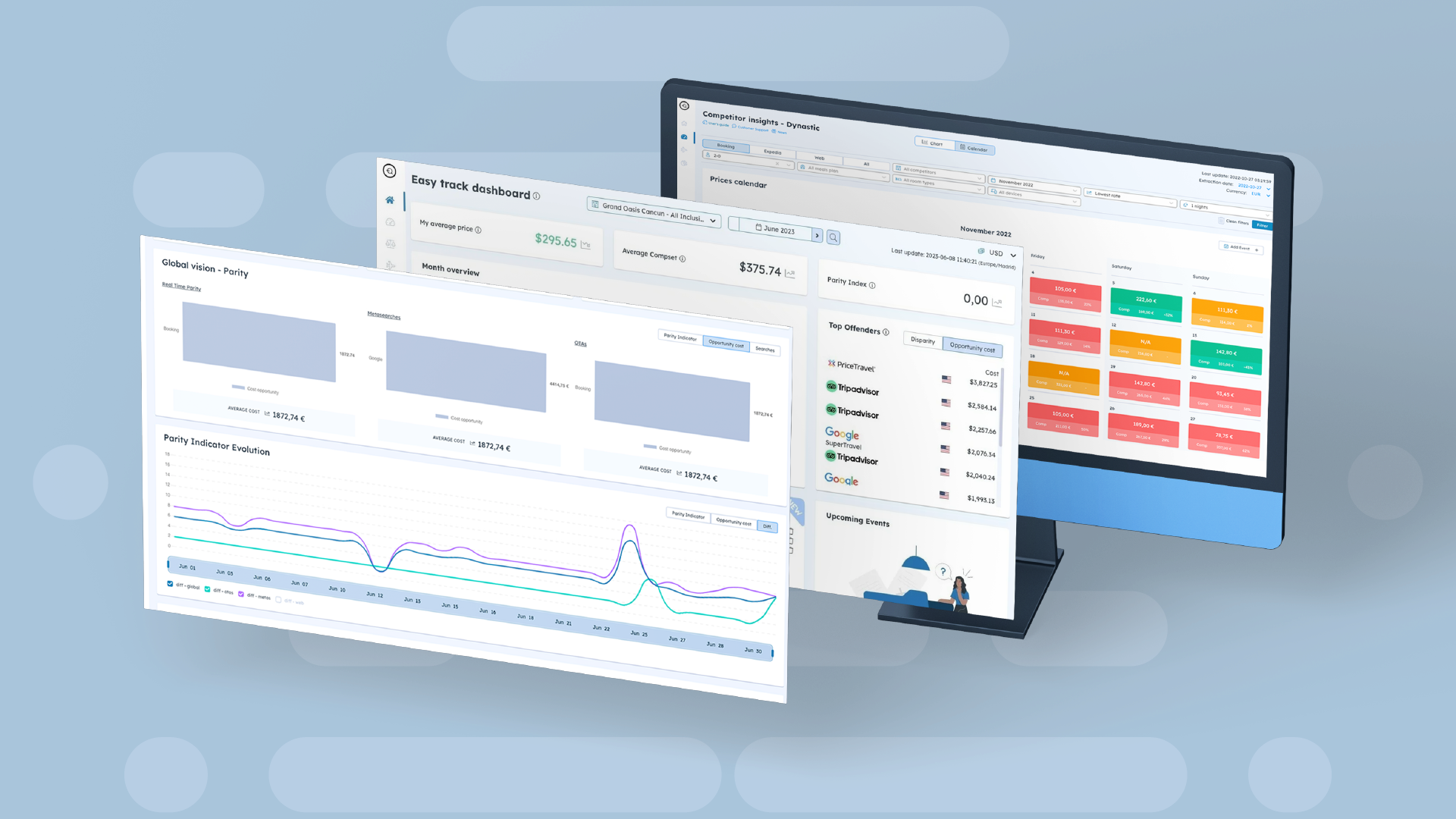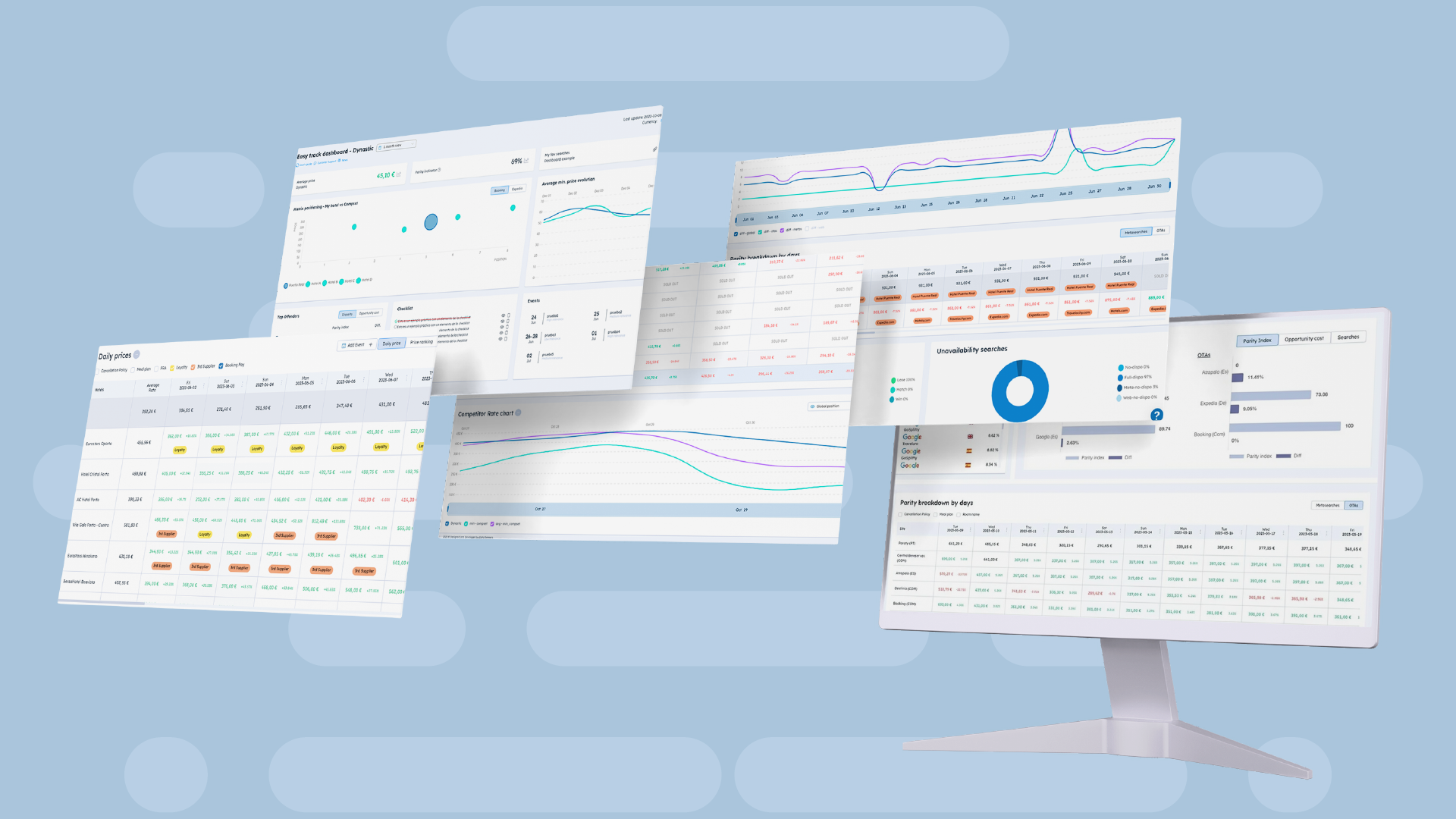Analyzing the impact of the Olympics on hotel rates with Price Seeker
Revenue 06/09/2024
With the Olympic and Paralympic Games taking place, Paris, the host city of this year, has become the biggest tourist hotspot since the end of July. The French capital has seen a 72% increase in the number of visitors compared to the same period last year, according to data from the Paris Tourist Office (OTP).
Paris je t'aime (the name given to the city's tourist office) recorded 11.2 million visitors during the Olympic Games, 4% more than in the same period last year. Despite this large influx of tourists, 44.6% were residents of the Paris region, 40.2% were French from other regions who made the round trip in one day, and only 15.2% were foreign tourists.
As expected, hotel rates have seen a significant increase during the days of the sporting event. Monitoring different websites, we can see that the average price of a room has reached up to 700 euros , quadrupling the average of 160 euros that was marked in previous years.
Depending on the city, location and type of hotel, we collect varied results. To get an overview of the situation in the City of Light and its surroundings, Price Seeker, our price intelligence platform, reports that in the last 15 days, accommodation prices varied by 51% in Paris, with an increase of 19% in the last 48 hours.
While the rest of the destinations barely exceeded a 7% increase, according to the rate shopper analysis for hotels. On the other hand, “Chateauroux, with barely any hotel offer, kept sales closed up to 8 days before, opening sales at the last minute without raising its prices” , points out Cindy Johannson, Sales & Project Manager at Price Seeker . Furthermore, according to the hotel occupancy index, 81% of accommodations were fully booked in the last week of July and 76% in the first week of August, significantly exceeding occupancy levels of previous years. Despite the price increase, the volume of reservations has not been affected. The average daily rate (ADR) for a room in France in July has increased by 21% compared to the previous year, reaching an average of around 583 euros, according to the OTP.
Furthermore, according to the hotel occupancy index, 81% of accommodations were fully booked in the last week of July and 76% in the first week of August, significantly exceeding occupancy levels of previous years. Despite the price increase, the volume of reservations has not been affected. The average daily rate (ADR) for a room in France in July has increased by 21% compared to the previous year, reaching an average of around 583 euros, according to the OTP.
An article in Le Figaro exemplifies how an unnamed hotel in Belleville, an alternative Parisian area full of art galleries, raised its rates from €180 per night to €822 on the day of the Olympic opening ceremony.
The tourist wave is not limited to the Ville lumière , or in other words, the City of Lights. Bordeaux has seen an increase in occupancy, ranking second in terms of profiting from sporting events, according to data compiled by Price Seeker. Followed by Lyon, Marseille and Lille , where they also far exceeded the levels recorded before the event.
In addition to the absolute figures, the numbers show a change in purchasing patterns. Typically, most hotel reservations in Paris are made between 0 and 90 days before the date of stay. However, for the Olympic Games, 43% of reservations were made between 0 and 14 days before arrival, suggesting a more spontaneous or last-minute trend.
However, since the Olympic Games, the demand for accommodation in the city has decreased considerably. The data collected indicates that, once the celebrations were over, prices have returned to their usual levels.
 This behaviour could be interpreted as a strategy in which revenue managers concentrate so much on the event that, at the end, they opt for a relaxation in management, notes the Project Manager of Price Seeker. "We cannot determine with certainty the reasons behind this phenomenon, but the stable level of the data suggests that a significant flow of tourists is not expected in the French capital ," she adds.
This behaviour could be interpreted as a strategy in which revenue managers concentrate so much on the event that, at the end, they opt for a relaxation in management, notes the Project Manager of Price Seeker. "We cannot determine with certainty the reasons behind this phenomenon, but the stable level of the data suggests that a significant flow of tourists is not expected in the French capital ," she adds.
After such a large-scale event, tourists may prefer to wait a while before visiting Paris, until the city returns to its normal rhythm and the last vestiges of organisation disappear. However, we are in the middle of the peak season for travelling to France. In this context, could not adjusting prices to current demand have negative consequences in the coming weeks?
Paris je t'aime (the name given to the city's tourist office) recorded 11.2 million visitors during the Olympic Games, 4% more than in the same period last year. Despite this large influx of tourists, 44.6% were residents of the Paris region, 40.2% were French from other regions who made the round trip in one day, and only 15.2% were foreign tourists.
The price of accommodation is skyrocketing
As expected, hotel rates have seen a significant increase during the days of the sporting event. Monitoring different websites, we can see that the average price of a room has reached up to 700 euros , quadrupling the average of 160 euros that was marked in previous years.
Depending on the city, location and type of hotel, we collect varied results. To get an overview of the situation in the City of Light and its surroundings, Price Seeker, our price intelligence platform, reports that in the last 15 days, accommodation prices varied by 51% in Paris, with an increase of 19% in the last 48 hours.
While the rest of the destinations barely exceeded a 7% increase, according to the rate shopper analysis for hotels. On the other hand, “Chateauroux, with barely any hotel offer, kept sales closed up to 8 days before, opening sales at the last minute without raising its prices” , points out Cindy Johannson, Sales & Project Manager at Price Seeker .
 Furthermore, according to the hotel occupancy index, 81% of accommodations were fully booked in the last week of July and 76% in the first week of August, significantly exceeding occupancy levels of previous years. Despite the price increase, the volume of reservations has not been affected. The average daily rate (ADR) for a room in France in July has increased by 21% compared to the previous year, reaching an average of around 583 euros, according to the OTP.
Furthermore, according to the hotel occupancy index, 81% of accommodations were fully booked in the last week of July and 76% in the first week of August, significantly exceeding occupancy levels of previous years. Despite the price increase, the volume of reservations has not been affected. The average daily rate (ADR) for a room in France in July has increased by 21% compared to the previous year, reaching an average of around 583 euros, according to the OTP.An article in Le Figaro exemplifies how an unnamed hotel in Belleville, an alternative Parisian area full of art galleries, raised its rates from €180 per night to €822 on the day of the Olympic opening ceremony.
Tourist interest extends beyond Paris
The tourist wave is not limited to the Ville lumière , or in other words, the City of Lights. Bordeaux has seen an increase in occupancy, ranking second in terms of profiting from sporting events, according to data compiled by Price Seeker. Followed by Lyon, Marseille and Lille , where they also far exceeded the levels recorded before the event.
In addition to the absolute figures, the numbers show a change in purchasing patterns. Typically, most hotel reservations in Paris are made between 0 and 90 days before the date of stay. However, for the Olympic Games, 43% of reservations were made between 0 and 14 days before arrival, suggesting a more spontaneous or last-minute trend.
However, since the Olympic Games, the demand for accommodation in the city has decreased considerably. The data collected indicates that, once the celebrations were over, prices have returned to their usual levels.
 This behaviour could be interpreted as a strategy in which revenue managers concentrate so much on the event that, at the end, they opt for a relaxation in management, notes the Project Manager of Price Seeker. "We cannot determine with certainty the reasons behind this phenomenon, but the stable level of the data suggests that a significant flow of tourists is not expected in the French capital ," she adds.
This behaviour could be interpreted as a strategy in which revenue managers concentrate so much on the event that, at the end, they opt for a relaxation in management, notes the Project Manager of Price Seeker. "We cannot determine with certainty the reasons behind this phenomenon, but the stable level of the data suggests that a significant flow of tourists is not expected in the French capital ," she adds.After such a large-scale event, tourists may prefer to wait a while before visiting Paris, until the city returns to its normal rhythm and the last vestiges of organisation disappear. However, we are in the middle of the peak season for travelling to France. In this context, could not adjusting prices to current demand have negative consequences in the coming weeks?





